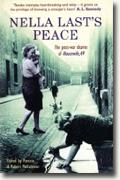Nella Last's Peace
Robert and Patricia Malcomson
book reviews:
· general fiction
· chick lit/romance
· sci-fi/fantasy
· graphic novels
· nonfiction
· audio books
· author interviews
· children's books @
curledupkids.com
· DVD reviews @
curledupdvd.com
newsletter
win books
buy online
links
home
for authors
& publishers
for reviewers

 |
Nella Last's Peace: The Post-War Diaries Of Housewife, 49 Robert and Patricia Malcomson Profile Books Paperback 288 pages March 2009 |
|
In 1937, Mass Observation was formed by an anthropologist to gauge public opinion about the abdication of England’s King Edward VIII. It soon grew into a decades-long study of British society, employing questionnaires and journals from more than 500 “average” people who bared souls and secrets in the process.
Many of us imagine that with the end of war comes an immediate sense of reprieve, security, even joy. It is clear from Nella’s entry of 22 August 1945 that such optimistic thinking fails to consider not only the effects of trauma but also the inevitable changes that the war machine enabled. “Tonight I thought of the dreadful new bomb…” Nella writes, “…we will always live in the shadow of war now… no country will ever be safe, however big their armies and navies.” Fear and loss are recurring topics in Nella’s diary. As the clearly-defined threats of war subside, an entire population finds itself adrift in the aftermath. There is no longer a foreign enemy to fight against nor a glorious cause to fight for; instead, Nella and others like her struggle with anxiety about the future and the emptiness of these transition years. Nella often seems to be naming the root cause of her anxiety and restlessness as her pen writes: “I want to feel I am helping, in however small a way. I want the laughter and fellowship of the war years,” and “People don’t feel that sense of hope and thankfulness now.” For women, in particular, the end of war meant a future filled with memories of loved ones lost in battle or lifelong caretaker duties if their sons and husbands came home no longer whole. Nella was one of the lucky ones – both her sons survived their military service without significant damage. Still, like many of the women who aided the war effort by taking up work outside the home, Nella dreaded the return to domestic servitude. During a period in which her emotionally reserved husband shows his annoyance at her redecorating efforts by “barely speaking when spoken to, glancing at the changed walls pitifully like a ham actor,” Nella is struck by how much the past few years have changed her: “I feel often I look at another tiresome stranger, wonder at my own weakness of attitude, which led me to be shut up like a dog… I feel it [outside work] has fostered something in me that would have been better not.”Nella Last never sought publication for her writing and probably never even considered herself a writer. Her diary proves, though, that she was a keen observer with the ability to chronicle in simple yet revealing prose the seemingly trivial details that are the fabric from which the greater story is woven. Her honest reports of marital spats and her own shortcomings are interspersed with accounts of creative rationing, the antics of neighborhood characters, and her unveiled opinion of the Americans (“America again has emerged unscathed, her people at home unaware there has been a war, except for a little rationing…”). The editors of Nella Last's Peace Nella Last's Peace Originally published on Curled Up With A Good Book at www.curledup.com. © Deborah Adams, 2009 |
|
|
|
 Click here to learn more about this month's sponsor! |
|
| fiction · sf/f · comic books · nonfiction · audio newsletter · free book contest · buy books online review index · links · · authors & publishers reviewers |
|
| site by ELBO Computing Resources, Inc. | |
 Nella Last was one of the ordinary British citizens who participated in the Mass Observation project. Beginning in August 1939, Nella faithfully recorded the details of her life, making diary entries almost daily. The sum of her journal from 1939 to 1945 contains more than a million words about wartime;
Nella Last was one of the ordinary British citizens who participated in the Mass Observation project. Beginning in August 1939, Nella faithfully recorded the details of her life, making diary entries almost daily. The sum of her journal from 1939 to 1945 contains more than a million words about wartime;